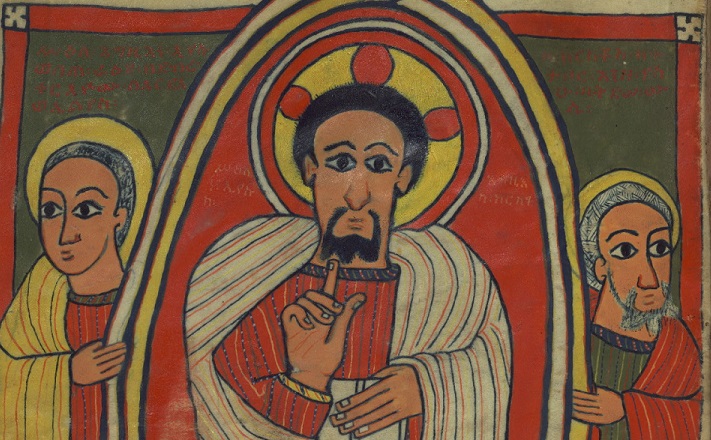Commentary on Psalm 99
Psalm 99 is the last of the six “Enthronement Psalms” in Book Four of the Psalter.
They include Psalm 93 and Psalms 95-99 and celebrate God as sovereign (or king — melek, as in many translations) over all of creation (see 93:1; 95:3; 96:10; 97:1-2; 98:6; 99:1, 4). They further declare that God is the creator and sustainer of the world (93:1-2; 95:4-6; 96:10); that God is the judge and arbiter of the world (93:5; 96:13; 97:8, 10; 98:2, 9; 99:4, 8); and that God is righteous, holy, and majestic (93:4; 96:6-8; 97:6, 12; 98:1, 9; 99:3, 5, 9).
In response to the holy God who creates, sustains, and judges the world, the Enthronement Psalms call on all creation, not just humanity, to praise God. In Psalm 93, the floods, the waters, and the seas lift their voices (vv. 3-4); in Psalm 95, humanity is called to worship, bow down, and kneel before God (v. 6); Psalms 96 and 98 enjoin all the earth to “sing a new song” to the Lord (96:1 and 98:1); Psalm 96 calls on the heavens to be glad, the earth to rejoice, the field to exult, and the trees to sing for joy (vv. 11-12); in Psalm 97, the earth, the coastlands, and the heavens rejoice and are glad (vv. 1, 6); and Psalm 99 calls on all peoples to praise God’s holy name.
An interesting component of the Enthronement Psalms, one that appears prominently in Psalm 99, is the character of the praise that is due God. We read in 99:1, “let the people tremble . . . let the earth quake” (NRSV). The word translated “tremble” is from the Hebrew root word ragaz and literally means “to tremble, to be afraid.” The word translated “quake” is from the Hebrew root word nute and literally means “to shake.” Similar language occurs in 96:9 and 97:4-5. The presence of God is an awe-invoking experience. The proper response of humanity and the rest of creation is indeed “trembling with fear and shaking.”
Psalm 93:1, though, states that God “has established the world; it will never be moved.” The word translated as “moved” in the NRSV is mute, which literally means to “shake, totter.” How do we reconcile the firm stability of the earth in Psalm 93 with the call to the earth “to quake, to shake” in Psalm 99? The Hebrew words used in the two psalms provides, I think, the answer. In Psalm 93, the word translated as “earth” is tebel, a word that occurs repeatedly in the Enthronement Psalms (93:1; 96:10, 13; 97:4; 98:7, 9) and is best understood as the “inhabitable world,” the world that God formed as a dwelling place for God’s creation. The word translated as “earth” in Psalm 99:1 is ‘erets, better translated as “land.” ‘Erets is used primarily in the Old Testament to designate national lands, political boundaries, thus providing a good tie to the call to “all peoples” to praise God in v. 2.
Psalm 99 is unique among the Enthronement Psalms in that it does not include a call to creation to praise God such as we encounter in the other Enthronement Psalms. Rather, it focuses on humanity, all humanity. Verse 1 says “let the peoples tremble.” In Hebrew, the word for people, ‘am, indicates a single people group, such as the Israelites, the Philistines, the Moabites, etc. When the word is plural, ‘amim — “peoples,” it indicates more than one people group. Verse 1 of Psalm 99 is thus a clear call to people groups beyond the children of Israel to “tremble” at the presence of God, who is a “lover of justice,” who has “established equity and executed justice and righteous in Jacob” (v. 4).
With verse 4’s words, “in Jacob,” the psalm singer moves the focus of the psalm from all humanity to God’s chosen people, the children of Jacob. Moses, Aaron, and Samuel are named perhaps as representatives of the children of Jacob. According to verse 8, “they cried to the LORD, and he answered them.” And verse 9 references “the pillar of cloud,” the physical appearance of God to the Israelites as they traversed the Sinai Wilderness on their way from Egypt to the Promised Land (see Exodus 13:21-22; 14:19, 24; 33:9-10; Numbers 12:5; 14:14). A physical appearance of God to humans is called a “theophany,” and Psalm 99 celebrates the continued presence of God, the theophany to ALL of the people throughout the Wilderness time. The presence of Samuel is a bit puzzling. Samuel’s connection to Moses and Aaron can be made in that they each cried out to God about the sinfulness of the people of Israel (see Exodus 32:7-14; Numbers 16:20-22; 1 Samuel 7:5-11). And Psalm 99:8 states, “You answered them; you were a forgiving God to them, but an avenger of their wrongdoings.” God is gracious, but God will mete out justice to the children of Jacob and to all peoples.
Psalm 99 is a fitting lectionary reading for Transfiguration Sunday. Paired with the reading from Exodus 34 — the shining face of Moses as he descended a second time from receiving the “torah” on Mt. Sinai, and with 2 Corinthians 3 and 4 — a further elaboration and interpretation of that incident in Moses’ life, these readings provide a deeper level of understanding and appropriating the story of the Transfiguration of Jesus told in the gospel of Luke. The Transfiguration story in the New Testament is yet another theophany, another appearance of God. Jesus, the man, is transfigured into his godly likeness. The only response humanity can offer is “trembling with fear and shaking” as we praise the appearance, knowing that our creator God has firmly established the “habitable world,” and it will never “be moved” or “shaken.”


February 7, 2016